University Writing Program Faculty & Staff
For questions relating to First Year Writing, please email Richard Colby at richard.colby@du.edu;
For questions related to the University Writing Center, please email Juli Parrish at juli.parrish@du.edu
For all other questions, email writing@du.edu.
Faculty Accomplishments
Our faculty are active writers and collaborators on and off campus. The Writing Program faculty publish in a rich assortment of venues, and their scholarly and creative interests contribute to their commitment to the teaching of writing.
Faculty Creative and Scholarly work and collaborations
Our People
Meet the faculty and staff that comprise the University Writing Program.
-
Brad Benz
Since 2010, Brad Benz has been a faculty member in the Writing Program. He teaches Advanced Seminar, First-Year Seminar, Environmental Writing, and WRIT 1122/1133. His research focuses on mentoring, green rhetoric, genre, and writing across the curriculum. He lives in Denver with his daughter and their dog.
Teaching Professor
PhD, University of Washington
Office: AAC 380K
Phone: 303-871-7448
Email: bradley.benz@du.eduBenz website: https://bpbenz.com
-
Russell Brakefield
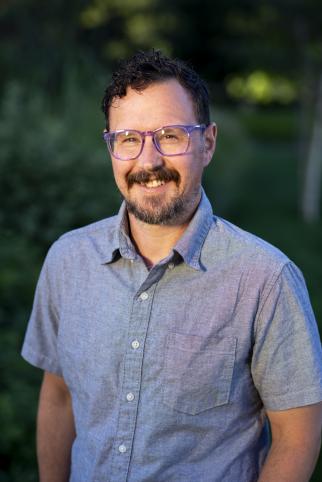
My approach to teaching is tied to a strong belief in writing as a social act, an opportunity for connection, community, and activism. The act of making, for many, is both revolutionary and sustaining. I am also a maker myself, of music, poetry, fiction, and essays. These are my passions, and these passions have given me a voice and provided me a community. In my courses, I ask students to write about their own passions and interests, to consider the role writing and research plays in their communities. I'm also passionate about the environment and about the relationship between environmentalism and social justice. I often invite students to develop writing and research projects that explore these relationships and offer potential modes of social action around causes of environmental collapse as well as environmental justice issues in their communities.
Teaching Assistant Professor
MFA, University of Michigan
Office: AAC 380Q
Phone: 303-871-7448
Email: russell.brakefield@du.edu -
Jennifer Campbell
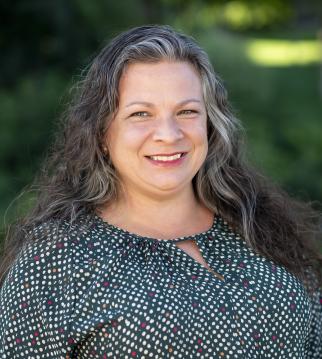
Jennifer Campbell has been a dedicated teacher of undergraduate writing and student advocate for over 25 years and joined the DU Writing Program in 2006. Her teaching, scholarship, and service interests include: writing and well-being; inclusive pedagogy; technical and professional writing; writing across the curriculum; curriculum and assessment; and transfer student support. Campbell served as our first Assistant Director for First-Year Writing, helped develop the Minor in Writing Practices, and co-authored Situating Research, a textbook for WRIT 1133. She has worked extensively at the University level on shared governance and general education revision and is currently Chair of the Academic Planning Committee of the Faculty Senate.
Teaching Professor
PhD, Auburn University
Office: AAC 381B
Phone: 303-871-7448
Email: jennifer.campbell@du.edu -
Sheila Carter-Tod
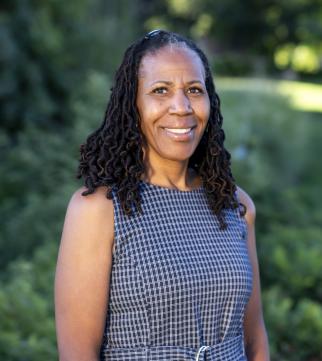
Sheila Carter-Tod teaches composition theory and pedagogy courses, courses in rhetoric and race and first-year writing courses. She is the director of the Black Studies Minor and teaches introduction to Black Studies and the Black Studies capstone course. Disciplinarily, she has chaired and served on numerous NCTE’s committees, and held leadership roles on CCC and CWPA’s executive boards and committees. She has published in College Composition and Communication, Enculturation, Composition Studies, Council of Journal of Writing Program Administration and others. In her research teaching, service and outreach, she works to create equitable, visible and accessible structures and infrastructures.
Executive Director, University Writing Program
Professor, Department of English and Literary ArtsPhD, Virginia Tech
Office: AAC 282B
Phone: 303-871-7447
Email: sheila.carter-tod@du.edu -
Libby Catchings
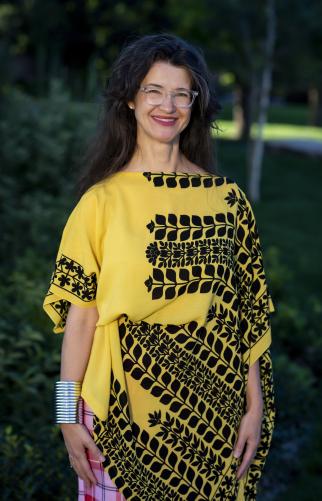
For me, writing delivers both self-knowledge and "poetic world-making" (Warner 2002) - a techne that makes every classroom encounter an opportunity for re-imagining our potential as ethical rhetorical agents. I think teaching writing also requires a sense of play, and an awareness of the materiality of both our bodies and the writing process. For that reason, I incorporate a variety of visual, sonic, and kinaesthetic practices into class; more often than not, you'll find crayons and voice recordings a part of the classroom experience. That multimodal disposition also informs my community-engaged research in prisons, making use of rhetorical phronēsis as a methodological framework for both fieldwork and the curation of that research.
Teaching Associate Professor
PhD, University of California, Irvine
Office: AAC 380F
Phone: 303-871-7448
Email: elizabeth.catchings@du.edu -
April Chapman-Ludwig
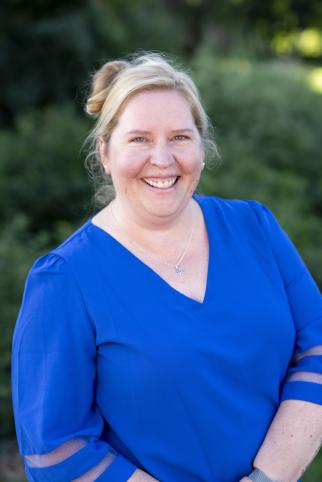
April Chapman-Ludwig has been teaching in the University Writing Program since 2007. During that time, she has taught writing courses centered around narrative rhetoric, women’s rhetorics, multimodal rhetorics, folklore, (auto)ethnographic studies, documentary, and transfer student experiences. Her current research and service center on support for transfer students. In that spirit, she was instrumental in piloting WRIT 1533, a course-specific for transfer students, and is a co-investigator on a six-year longitudinal study. She has also presented at national and international conferences including CCCC, AAC&U, RSA, and ISHR.
Teaching Professor
MA, Illinois State University
Office: AAC 381A
Phone: 303-871-7448
Email: april.chapman-ludwig@du.edu -
Richard Colby
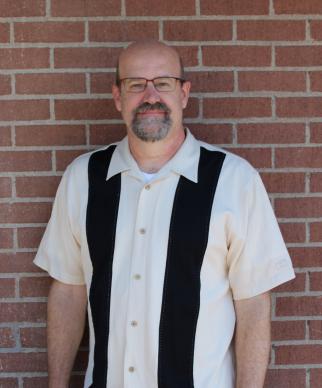
Richard Colby is originally from sunny southern California, home of smog, movies, and Disneyland. His courses focus on writing in various nonfiction genres, including travel, food, and especially games. His primary research interest is the intersections between writing studies and computer, board, and card games. He has presented at numerous national conferences on writing and teaching. His most recent books include the co-edited collections The Ethics of Playing, Researching, and Teaching Games in the Writing Classroom and Rhetoric/Composition/Play through Video Games. Richard earned his PhD in Rhetoric & Writing at Bowling Green State University.
Director of First Year Writing
Teaching Professor
PhD, Bowling Green University
Office: AAC 282A
Phone: 303-871-7702
Email: richard.colby@du.edu -
David Daniels
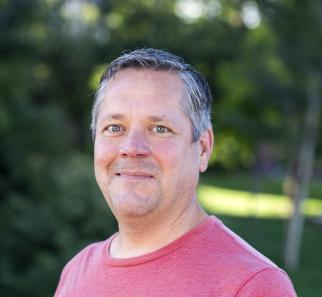
In the classroom, I try to create a friendly, nurturing environment that puts student processes of discovery and invention at its center. My side gig is writing and editing poetry, and I bring that spirit of collaboration and creativity into the classroom. My focus is less on producing "better writing" during the quarter but on creating better writers long-term. Writers who are prepared to confront whatever writing situations their academic, civic, and professional lives might bring them.
Teaching Professor
MFA, Indiana University
Office: AAC 380G
Phone: 303-871-7448
Email: david.j.daniels@du.edu -
Rob Gilmor
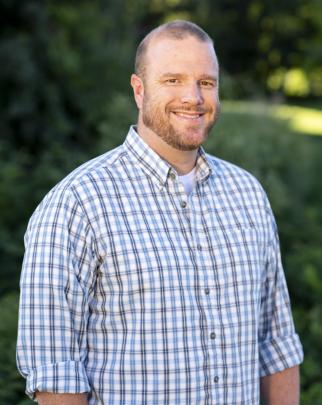
My main classroom focus is teaching with archives; I collaborate with librarians across the disciplines to encourage students to explore the diverse and often challenging contexts of materials that resist easy interpretation. My classes address real audiences in the DU Community with exhibits of student work in public places on campus that invite students into important conversations about public discourse and knowledge. Outside the classroom, I’ve co-lead a multi-year research project and curriculum pilot program that’s helped to created new programming for transfer students at DU, and I coordinate the Community Writing Center at The Gathering Place. My scholarship explores rhetorical theory and how university archives can shape institutional identities.
Teaching Professor
PhD, University of Denver
Office: AAC 380N
Phone: 303-871-7448
Email: robert.gilmor@du.edu -
Matthew Hill
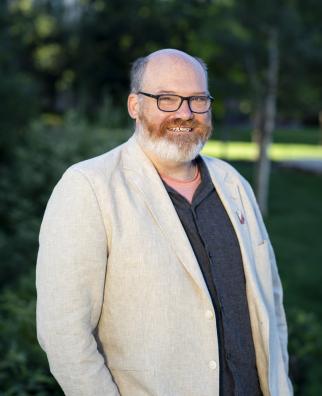
Be it through remix videos, essays and written research, soundscapes and scripted podcasts, or my current experiments with analogue/board games, I encourage students to write in different contexts. Outside the classroom my current projects include games as rhetorical theory and a research project about the histories of sound and rhetorical violence.
Teaching Associate Professor
ABD, Michigan Technological University
Office: AAC 380J
Phone: 303-871-7448
Email: matthew.a.hill@du.edu -
Megan Kelly
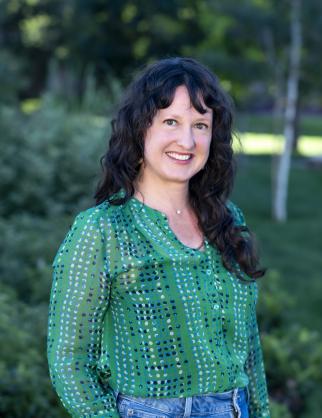
Megan J. Kelly is Teaching Professor in the Writing Program at the University of Denver. Her pedagogy is deeply influenced by her time working in writing centers, both as a graduate student and as the former Assistant Director of the DU Writing Center. She teaches classes on storytelling for social change, writing for well-being, and training peer tutors in antiracist and anti-ableist practices. In her service and scholarship, she is further committed to supporting students and faculty as writers. Her current research project centers the experiences of disabled and neurodivergent students in writing classes. The founding faculty advisor for the student organization Divest DU, she is also invested in the rhetorical work of student activists in the climate justice movement. As Program Coordinator for Faculty Writing Support, she organizes and facilitates faculty writing groups and retreats.
Teaching Professor
ABD, University of Washington
Office: AAC 380E
Phone: 303-871-7448
Email: megan.j.kelly@du.edu -
Kamila Kinyon-Kuchař
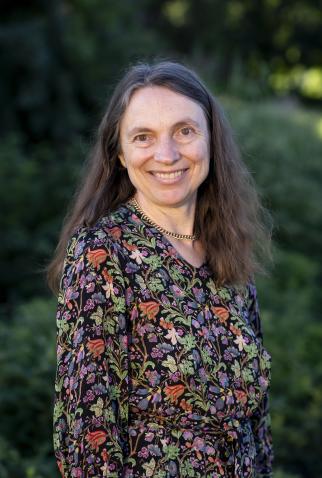
In my classes, I encourage students to draw on their diverse backgrounds and interests in shaping meaningful argumentative and personal writing. My teaching has focused on the rhetoric of journalism, oral history, and ethnography, which has also been a subject of my research and service. I am a member of the DU Ethnography Lab (DUEL) which supports students, faculty, and community partners in conducting socially engaged ethnographic work. My work with DUEL has led to several conferences and publications, including an article for The Annals of Anthropological Practice and a chapter for the 2020/21 IWAC proceedings. Other teaching and research interests include Slavic Studies, immigration, multilingual writing, and visual rhetoric.
Teaching Professor
PhD, University of Chicago
Office: AAC 380W
Phone: 303-871-7448
Email: kamila.kinyon@du.edu -
Calley Marotta
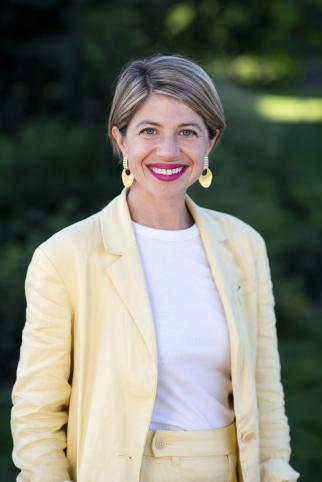
I am a former K-12 special education teacher and current Teaching Assistant Professor at the University of Denver. I am also a mother, Midwestern white woman, writer, partner, and friend. My courses focus on writing, language, and disability justice and ask students to make interventions toward a more just writing and research future. I also seek to be a co-conspirator who collaborates with students as a mentor, co-teacher, and co-researcher to center students’ lived experiences in teaching and research.
In my scholarship, I mix research and creative writing with participatory and ethnographic methods to value the literacies and knowledges of people who do essential labor and carework like custodial work and childcare. My scholarship has been supported by the Spencer Education Foundation and has been published in Research in the Teaching of English, Inside Higher Education, the Community Literacy Journal, and The Journal of Multimodal Rhetorics. I am grateful to scholarly lineages like Chicana feminist, womanist, and critical race theorists that have informed my work along with mentors in education including the students, families, and co-researchers I have worked with over the years.
On weekends you will find me drawing and playing dress-up with my daughter.
Teaching Assistant Professor
PhD, University of Wisconsin, Madison
Office: AAC 380R
Phone: 303-871-7448
Email: catherine.marotta@du.edu -
Heather N. Martin
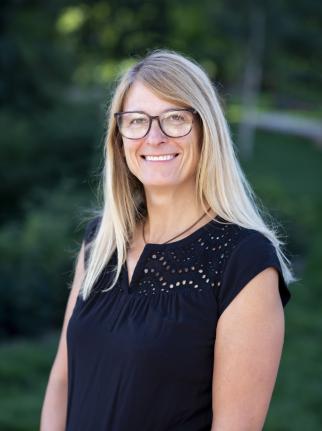
A writing professor for over twenty years, Heather N. Martin, Ph.D., centers the mutual exchange of ideas in her classroom. Inviting students to research and write about subjects like stand-up comedy, food access, and wellness, Dr. Martin uses a mentoring approach to foster inclusive learning environments for all writers. Many of her classes are community-engaged, wherein students are invited to explore greater Denver and likewise learn from experiences in the field. At the end of the day, Dr. Martin’s primary goal is to support students on their journey to becoming thoughtful, intentional, and effective writers.
Teaching Professor
PhD, University of Denver
Office: AAC 380B
Phone: 303-871-7448
Email: heather.martin@du.edu -
Logan Middleton
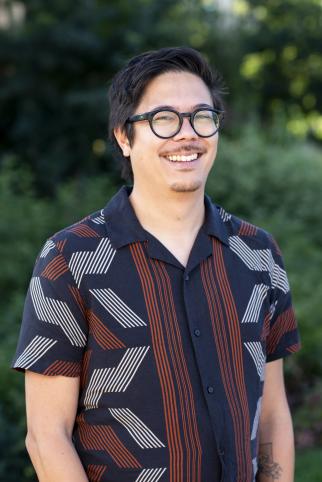
Logan Middleton is a Teaching Assistant Professor in the University Writing Program. He earned his PhD in English with a concentration in writing studies from the University of Illinois at Urbana-Champaign in May 2022. Logan’s research is located at the intersections of abolition and community literacies, where he seeks to identify and combat carceral logics of surveillance, obfuscation, and control in educational settings. In his teaching, Logan encourages students to experiment with multimodal meaning-making and also strives to center justice-oriented forms of community learning and praxis.
Teaching Assistant Professor
PhD, University of Illinois at Urbana-Champaign
Office: AAC 380A
Phone: 303-871-7448
Email: logan.middleton@du.edu -
Alfred Owusu-Ansah
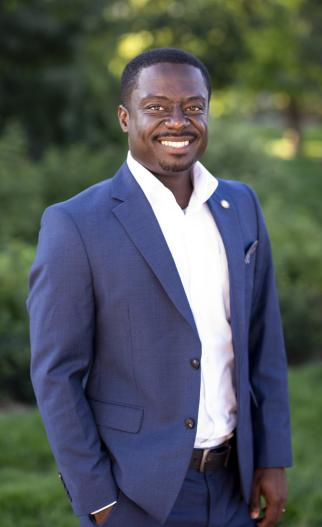
Alfred Owusu-Ansah joined DU’s Writing Program after earning his PhD from Michigan Technological University. Having worked with many francophone and international students, he has years of experience teaching writing classes to people who use English as an additional language. He is currently the lead instructor for the Writing Program’s English for Academic Purposes course. Alfred’s research and teaching seeks to amplify the voices of missing people – people whose writing and knowledge making practices are usually overlooked. His research seeks to argue for a broader understanding of literacy-in-action by advancing a posthman pedagogy for writing and programming. He has a paper in Composition Studies that discusses implications of generative AI on users of postcolonial varieties of English. His work with STEM faculty has led to co-authoring publications in IEEE Frontiers in Education and IEEE International Conference in Professional Communication. Alfred has previously served on the committee that directs the activities of the CCCC’s Writing and Rhetoric of Code group.
Teaching Assistant Professor
PhD, Michigan Technological University
Office: AAC 380X
Phone: 303-871-7448
Email: alfred.owusu-ansah@du.edu -
Juli Parrish
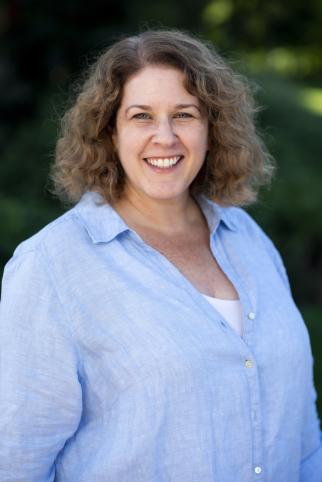
Juli Parrish is a Teaching Professor of Writing and Director of the University Writing Center. She earned her PhD in English with a concentration in literacy and pedagogy from the University of Pittsburgh in 2007. Juli’s research focuses on writing center theory and practice and on archives of unpublished writing by students; her work has appeared in Across the Disciplines, WLN Journal of Writing Center Scholarship, South Atlantic Review, and multiple edited collections, including her co-edited book, Literacy and Pedagogy in an Age of Misinformation and Disinformation. She is a co-editor of Literacy in Composition Studies and currently serves as president of the Rocky Mountain Writing Centers Association.
Director, University Writing Center
Teaching Professor
PhD, University of Pittsburgh
Office: AAC 282C
Phone: 303-871-7448
Email: juli.parrish@du.edu -
LP Picard
LP Picard (she/her) is a Teaching Professor in the University Writing Program. Since joining DU in 2012, LP has taught WRIT and FSEM courses themed around the popular artifacts that shape, reflect, and constitute human culture. LP’s writing assignments are open-ended and narrative-driven which 1) allows students to refine their unique writerly voices and 2) encourages students to take ownership of their intellectual and creative pursuits.
Outside of the classroom, LP is involved in projects that showcase and celebrate student authors. Her research interests include student agency, authenticity in writing classrooms, and the rhetorical opportunities of drag performance (for which she draws upon her experiences as a local performer and show organizer). LP earned the Distinguished Teaching Award in 2021.
Teaching Professor
MFA, Emerson College
Office: AAC 380P
Phone: 303-871-7448
Email: lpicard@du.edu -
David Riche
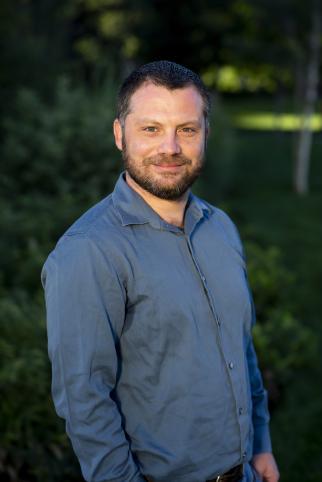
David Riche (he/him) is a Teaching Associate Professor in the University Writing Program. Since joining the program in 2016, he has taught a wide range of courses, including seminar-style classes about rhetorical theory, creative nonfiction, analog games, and the transfer student experience. As a teacher, David emphasizes the importance of rhetorical awareness, creative thinking, and student-centered authorship. As a scholar, he works at the intersection of writing studies, game studies, and contemporary rhetorical theory; his scholarship appears in Literacy in Composition Studies, Best of the Journals in Rhetoric and Composition 2019, and a forthcoming collection on teaching with analog games.
Teaching Associate Professor
PhD, Louisiana State University
Office: AAC 380Z
Phone: 303-871-7448
Email: david.riche@du.edu -
Rebekah Shultz Colby
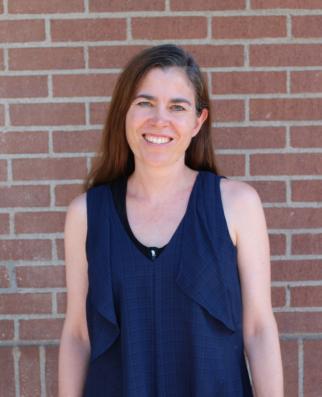
Since becoming a member of the DU Writing Program in 2006, Rebekah Shultz Colby’s research and teaching has examined how digital media, especially games, deepens rhetoric, writing, research, and pedagogy. She co-edited two collections, The Ethics of Playing, Researching, and Teaching Games in the Writing Classroom and Rhetoric/Composition/Play through Video Games. She is writing a book exploring how teachers use games to teach writing nationally and has articles in Computers and Composition and Technical Communication Quarterly adapted from two chapters. As a member of the CCCCs Council for Play and Game Studies, she is organizing C’s the Day. She earned her PhD in Rhetoric & Writing at Bowling Green State University.
Teaching Professor
PhD, Bowling Green University
Office: AAC 380Y
Phone: 303-871-7448
Email: rebekah.shultzcolby@du.edu -
Angela Sowa
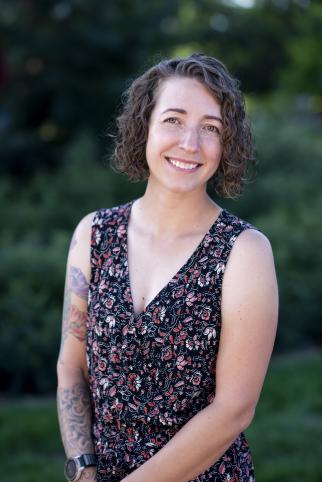
I enjoy helping students discover how to more effectively share their passions and perspectives through rhetoric. My classes often focus on genre theory and reflective practices as ways to promote transfer - I want students to use what the learn in my classes in contexts far beyond the bounds of their academic careers. My research interests include the relationship between gender and religious writing; social justice and literacy; and promoting writing transfer through self-assessment and reflective genres.
Teaching Professor
PhD, Texas Christian University
Office: AAC 380C
Phone: 303-871-7448
Email: angela.sowa@du.edu -
Geoffrey Stacks
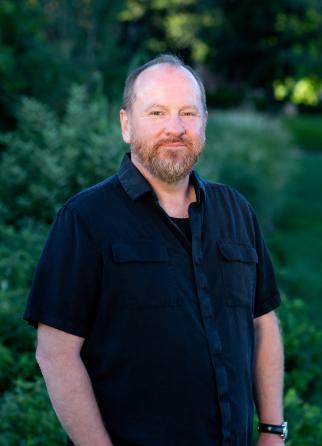
I earned my Ph.D. in American literature at Purdue University. Since 2006, I have been teaching composition and rhetoric here at DU. I also enjoy helping in the Writing Center, doing research on Writing Center practices, and birdwatching.
Teaching Professor
PhD, Purdue University
Office: AAC 380L
Phone: 303-871-7448
Email: gstacks@du.edu -
Jesse Stommel
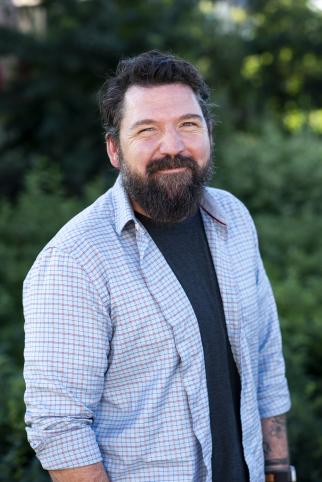
I've been teaching for over 20 years, and I'm also a documentary filmmaker, co-owner of a toy / game store, and dad to a rascal 6-year-old. I design courses that ask students to look closer. For me, the purpose of a writing course, a pedagogy course, a digital studies course, is to encourage students to engage more thoughtfully with their world. Writing is a practice and a process, thus the "-ing" on the end of the word. In my courses, we focus on the inventing, the doing, and the revising--not as much on the finishing, the being done. Writing is a tool, a medium we use to engage our subjects, however we also consider the nature of writing itself. I teach about games, maker-culture, film, horror, and queer rhetorics. I also teach courses focused on "writing about teaching" and "teaching about writing."
Teaching Associate Professor
PhD, University of Colorado Boulder
Office: AAC 380H
Phone: 303-871-7448
Email: jesse.stommel@du.edu
Twitter: @Jessifer -
Amanda Thompson
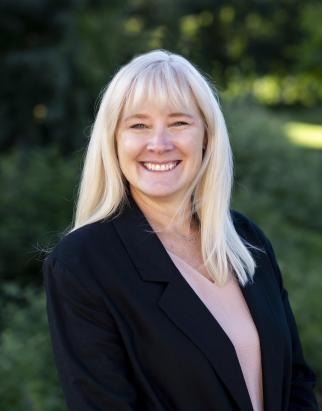
Amanda joined the University Writing Program as Program Manager in March 2023 after working in the Daniels College of Business for over three years. She loves working with faculty and students at all stages of their educational journeys.
Program Manager
MA, University of Oklahoma
Office: AAC 282
Phone: 303-871-7448
Email: amanda.thompson@du.edu -
Olivia Tracy
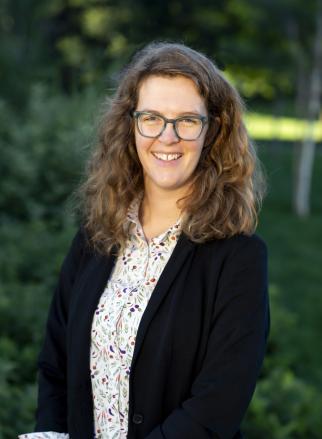
Olivia R. Tracy is a teaching assistant professor in the Writing Program and currently serves as assistant director of the Writing Center. Her teaching and research explore rhetoric and gender in technical writing, especially recipes, cookbooks, and botanical and medical texts. She also advocates for access in writing centers and writing classrooms, particularly through embodied and spatial practices. Her work has appeared in WLN: A Journal of Writing Center Scholarship, Praxis: A Writing Center Journal, and The Journal of Haitian Studies. Whether in the classroom or in consultations, she seeks to help writers compose across diverse rhetorical situations and discover the practices that benefit their individual writing processes.
Assistant Director, University Writing Center
Teaching Assistant Professor
PhD, University of Denver
Office: AAC 380M
Phone: 303-871-7448
Email: olivia.tracy@du.edu -
Nicole Turnipseed
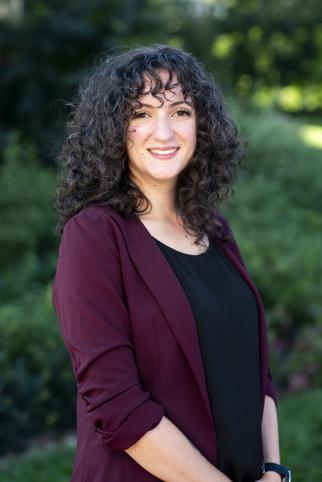
Nicole (Niki) Turnipseed joined the University Writing Program as a Teaching Assistant Professor in 2022 Broadly, Niki studies holistic literate development across disciplines, spaces, and lifeworlds. Her recent research includes work on a National Science Foundation funded transdisciplinary action research and mentoring project called Writing Across Engineering and Science (WAES) and a cross-institutional, ethnographic study of cross-disciplinary social justice programs in higher education. Her scholarship, teaching, and service are committed to cultivating open, equitable, and collaborative environments where community members are empowered to develop and express their individual and collective capacities as learners, teachers, and historical change agents.
Teaching Assistant Professor
PhD, University of Illinois at Urbana Champaign
Office: AAC 380V
Phone: 303-871-7448
Email: nicole.turnipseed@du.edu
Adjunct Faculty
Our adjunct faculty members also teach courses in the University Writing Program, but their primary assignments or responsibilities are outside the school.
-
Marisa G. Alger
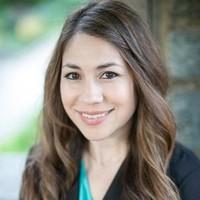
With a background in TEFL (Teaching English as a Foreign Language), I’ve worked with students from all over the world, from teaching English literacy to Buddhist nuns in rural Nepal to helping international business school students with their research papers and cover letters. My graduate research focused on utilizing creative writing and reflection exercises to make first-year college writing more engaging and meaningful for students. I aim to help students discover and develop their own writing (and thinking) process through discussion, collaboration, connection, reflection and joy.
MA, Johns Hopkins University
Office: AAC 356
Email: marisa alger@du.edu -
Bryn Brody
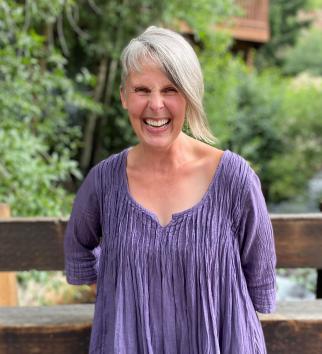
I’ve been teaching for over 25 years, the last three of which have been dedicated to college writing programs. My work with youth who have experienced trauma, as well as my current role as a suicide prevention trainer, influence my teaching style and the content we consume for class. I value the experiences each writer brings to the classroom, including individual world views and languaging practices. My classroom is filled with discussion, laughter, and the occasional tear as we wrestle with what it means to create meaning in community. As a researcher, I analyze the role social media plays in shaping our society. I’m particularly interested in how feminisms make their way from theory to popular culture.
MASJ, University of Colorado Denver
Email: Magan.Brody@du.edu -
Jo Davis
MA, Purdue University
Email: jonita.davis@du.edu -
Jonathan W. Fowler
MA, University of Wisconsin
Office: AAC 356
Email: jonathan.fowler@du.edu -
Amanda Meier
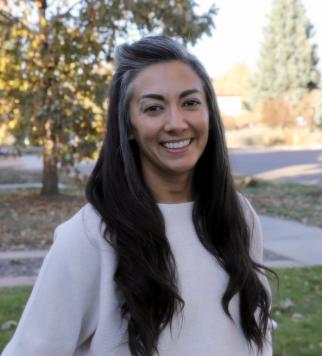
My approach to teaching writing and rhetoric is deeply rooted in my background as a linguist. In my courses, we don’t just write essays; we interrogate our own writing practices and try to understand the unique practices of different discourse communities. I’m constantly curious about how language choices shape our identity, influence social dynamics, and how we use language to define ourselves or set ourselves apart from others. Outside of school, I’m a mom to an amazing little human who wants to be a librarian and a paleontologist when she grows up. I’m a science fiction nerd, a competitive tennis player, and an experimental baker.
MA, Columbia University
Office: AAC 356
Email: amanda.m.meier@du.edu
Emerita
-
Doug Hesse
I've taught writing for 40 years now, which signifies two things. One, obviously, is that I've been around awhile. But more important, I think is that writing is still endlessly fascinating, and teaching still endlessly important. One of my scholarly interests is creative nonfiction: memoir, personal essay, immersive journalism, profiles, travel writing and the like. I'm fascinated with the craft and possibilities of writing, the decisions available to writers, the consequences of those decisions: the aesthetics as well as the rhetoric. This fascination informs all my teaching. I'm a past President of NCTE; past Chair of CCCC; and past President of WPA and have held other leadership roles.
PhD, University of Iowa
Email: dhesse@du.edu -
Carol Samson
Teaching Associate Professor Emerita
PhD English/Creative Writing, University of Denver



